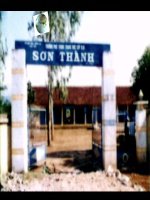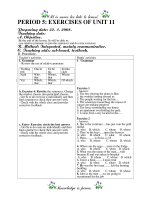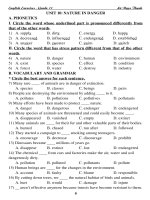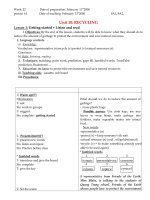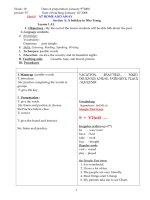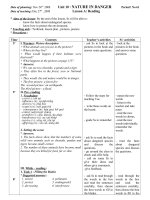- Trang chủ >>
- Lớp 10 >>
- Giáo dục công dân
Unit 10 ConservationReading
Bạn đang xem bản rút gọn của tài liệu. Xem và tải ngay bản đầy đủ của tài liệu tại đây (2.29 MB, 36 trang )
<span class='text_page_counter'>(1)</span>WARMUP.
<span class='text_page_counter'>(2)</span> WHAT WILL OUR PLANET look LIKE IN THE FUTURE?.
<span class='text_page_counter'>(3)</span>
<span class='text_page_counter'>(4)</span>
<span class='text_page_counter'>(5)</span>
<span class='text_page_counter'>(6)</span>
<span class='text_page_counter'>(7)</span>
<span class='text_page_counter'>(8)</span>
<span class='text_page_counter'>(9)</span>
<span class='text_page_counter'>(10)</span> Environmental problems air. r e t a w forest ty i s r e v biodi. climate change.
<span class='text_page_counter'>(11)</span> Unit 10. CONSERVATIO READING LESSON. Class: 10A2.
<span class='text_page_counter'>(12)</span> Choose one appropriate word for each definition: NEW run-off , lose, circulation of water, hydroelectric, WORDS. defence, eliminate, loss the state of no longer having something or Loss (n) someone eliminate (v). remove or take away. hydroelectric (a). relating to or producing electricity by the force of fast moving water. circulation of water. the movement of water around a closed system. run-off (n). liquid that flows off land into streams and rivers. defence (n). act of protect someone or sth from attack.
<span class='text_page_counter'>(13)</span> Hydroelectric (a). Hydroelectricity (n) A hydroelectric plant.
<span class='text_page_counter'>(14)</span> Natural circulation of water: the movement of water around a closed system.
<span class='text_page_counter'>(15)</span> Run-off (n) liquid that flows off land into streams and rivers.
<span class='text_page_counter'>(16)</span> Verb. CHART of FAMILY WORDsNoun. eliminate. elimination. Adjective. hydroelectricity. hydroelectric. destroy. destruction. destructive. circulate. circulation. circulatory. defend. defence. defensive. vary. variety. various.
<span class='text_page_counter'>(17)</span> Whilereading.
<span class='text_page_counter'>(18)</span>
<span class='text_page_counter'>(19)</span> Use the correct form of the words to fill TASK in the blanks 1. I'm going to karate lessons to learn how to __________ 1 myself. (defence) 2. A move towards healthy eating could help _________ heart disease. (elimination) 3. We eventually found the answer by a process of _____________. (eliminate) 4. I worry about the _____________effect that violent films may have on children. 5. The _____________ system is composed of the heart and blood vessels, including arteries, veins, and capillaries. 6. The internet is an ____________ source of information..
<span class='text_page_counter'>(20)</span> Students’ presentation The importance ofFOREST : WATER BIODIVERSITY.
<span class='text_page_counter'>(21)</span> What we can get from nature • Plants absorb greenhouse gases and help stop global warming. • It is easier for biodiverse ecosystems to recover from natural disasters. • Healthy biodiversity of species can provide a variety of food (like meat and products). • Many of our medicinal drugs come from plants. • All of our wood products come from nature. • Many recreational areas benefit from a healthy ecosystem, which promotes tourism. • Biodiversity is beautiful and should be enjoyed. • These values are free to us, but as we lose biodiversity the cost of replacing these (if even possible) would be very high!.
<span class='text_page_counter'>(22)</span> Students’ presentation The threat to: FOREST WATER BIODIVERSITY.
<span class='text_page_counter'>(23)</span> • Using up natural resources before they can be renewed (over-fishing in oceans, or over-harvesting trees on land) • Habitat destruction like clearing forests or draining wetlands for towns or agricultural purposes • Releasing invasive species into foreign ecosystems (like the cane toad in Australia or the zebra mussel in the Great Lakes or yellow snails in our country ) • Any kind of pollution (water, air, soil, etc). • Failure of food chains.
<span class='text_page_counter'>(24)</span> Students’ presentation The solutions of: FOREST WATER BIODIVERSITY.
<span class='text_page_counter'>(25)</span> • You can volunteer at a nature center, park, or a zoo..
<span class='text_page_counter'>(26)</span> • Be careful not to buy coral, ivory, or products made from animals. They come from endangered species..
<span class='text_page_counter'>(27)</span> Buy organic produce.
<span class='text_page_counter'>(28)</span> • Add mulch to soil to prevent erosion..
<span class='text_page_counter'>(29)</span> • Don’t use pesticides; they can kill plants and animals..
<span class='text_page_counter'>(30)</span> • Stop junk mail to save paper and protect our forests..
<span class='text_page_counter'>(31)</span> • Use cloth napkins and cotton handkerchief instead of paper ones..
<span class='text_page_counter'>(32)</span> • Recycle old newspaper and buy recycled paper products..
<span class='text_page_counter'>(33)</span> • Use e-mail since it saves paper..
<span class='text_page_counter'>(34)</span> • You should always use eco-friendly cleaning products..
<span class='text_page_counter'>(35)</span> ow Can You Help? • You can volunteer at a nature center, park, or a zoo. • Buy organic produce. • Add mulch to soil to prevent erosion. • Don’t use pesticides; they can kill plants and animals. • Stop junk mail to save paper and protect our forests. • Use cloth napkins and handkerchiefs instead of paper tissues. • Recycle old newspaper and buy recycled paper.
<span class='text_page_counter'>(36)</span> THE END.
<span class='text_page_counter'>(37)</span>
